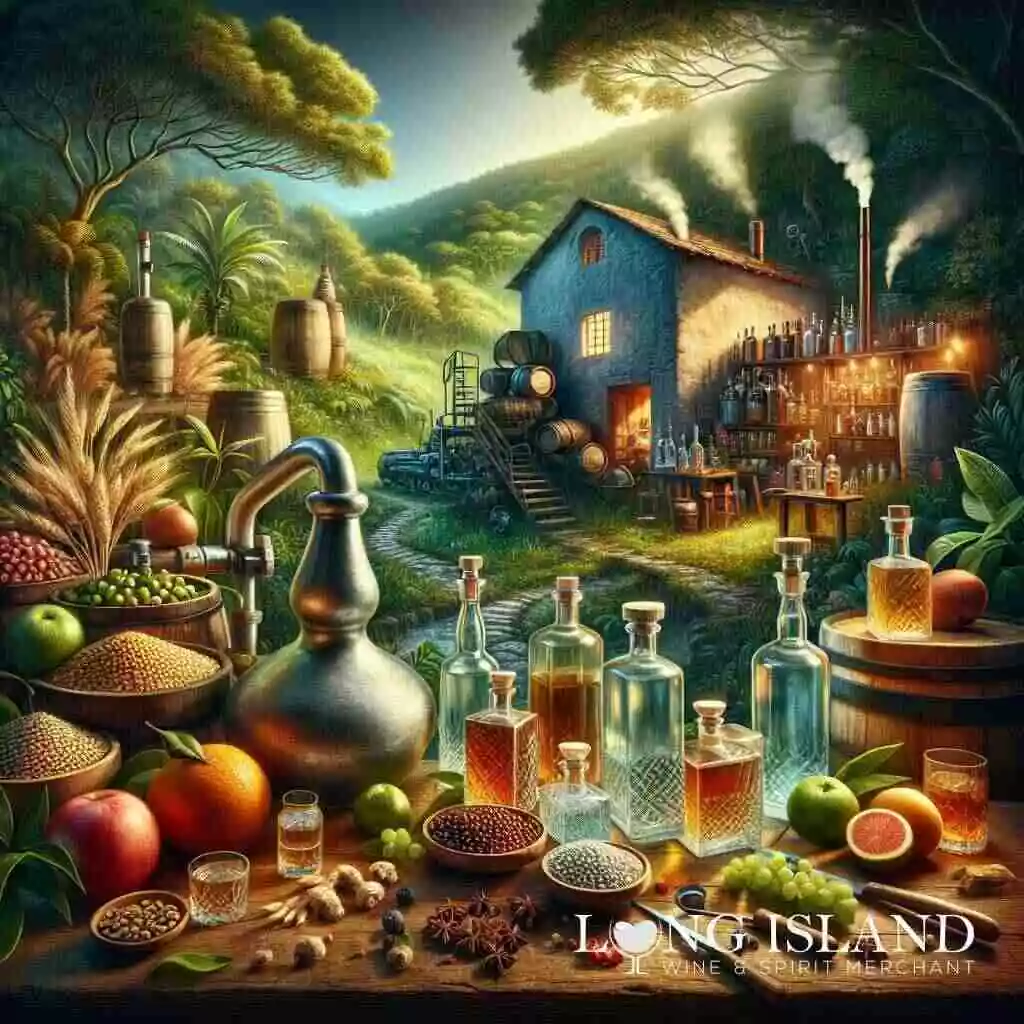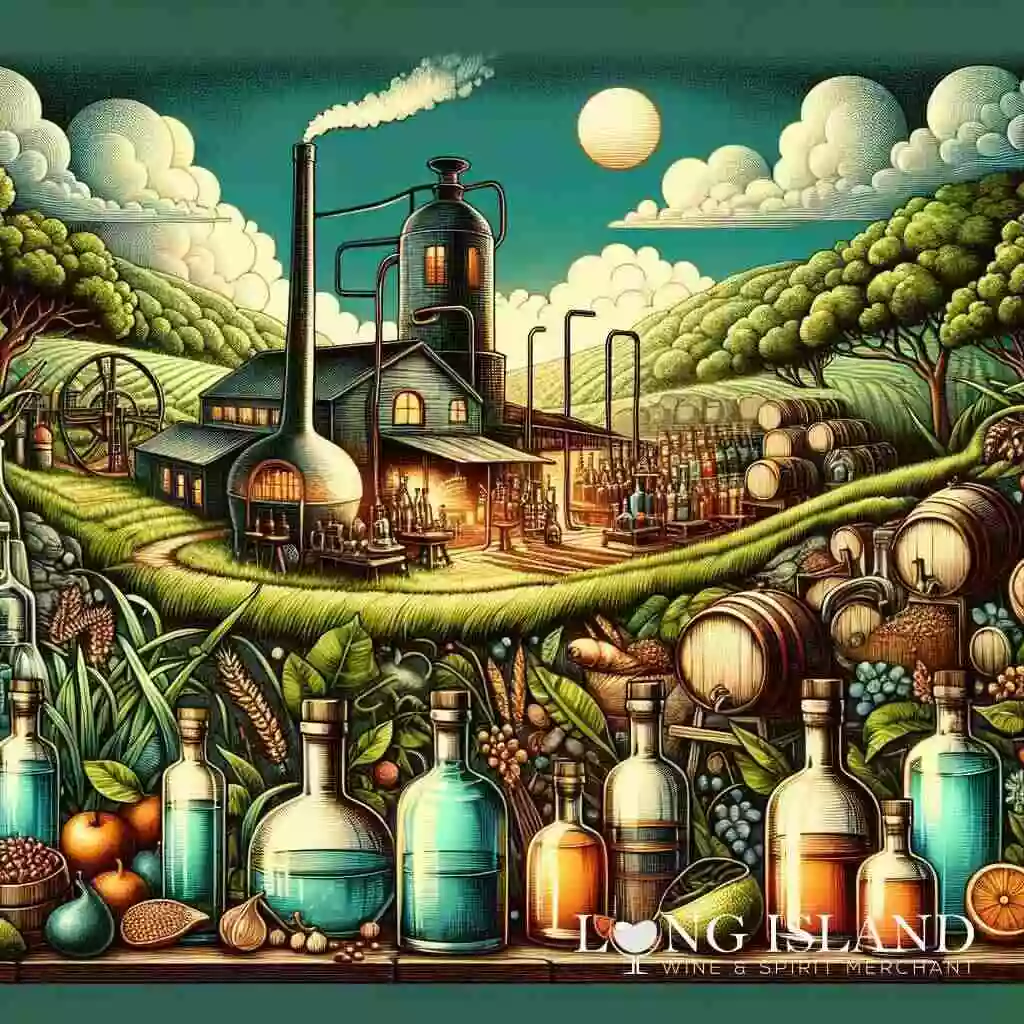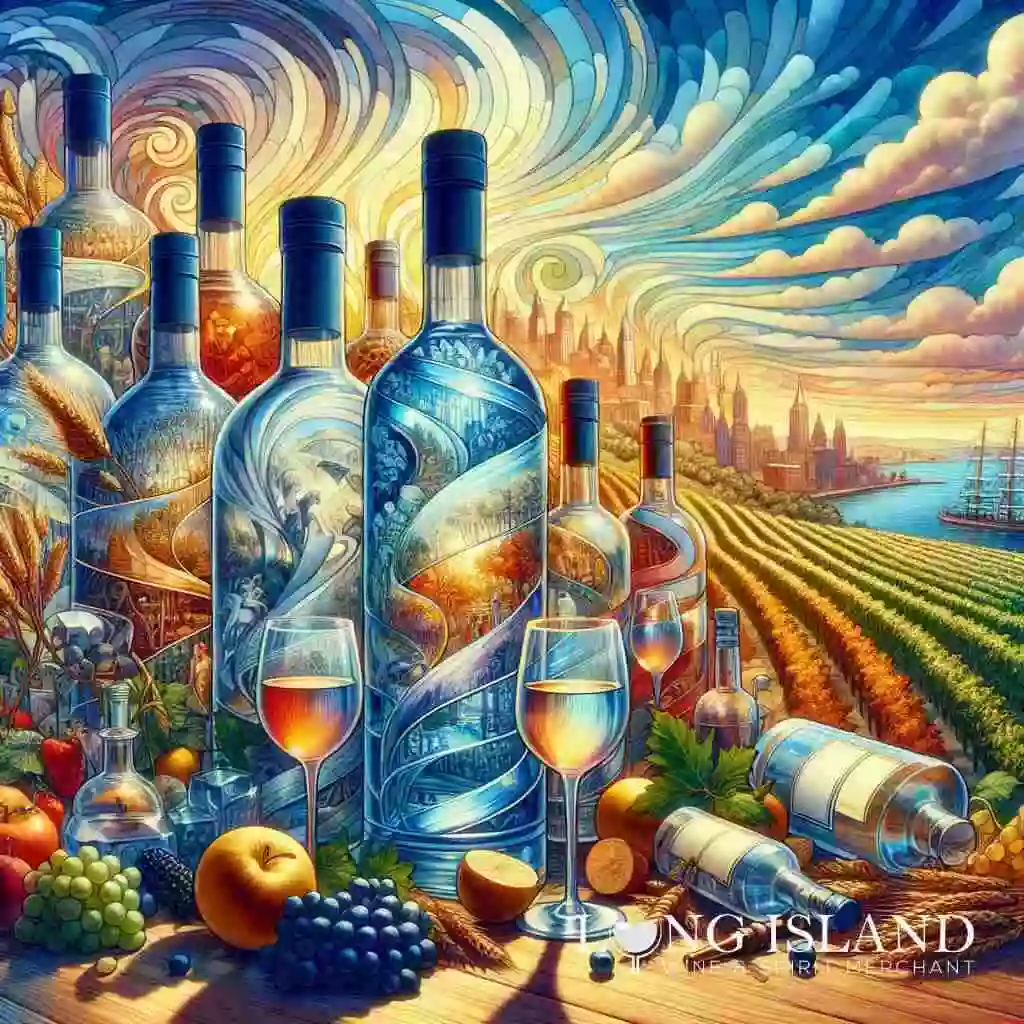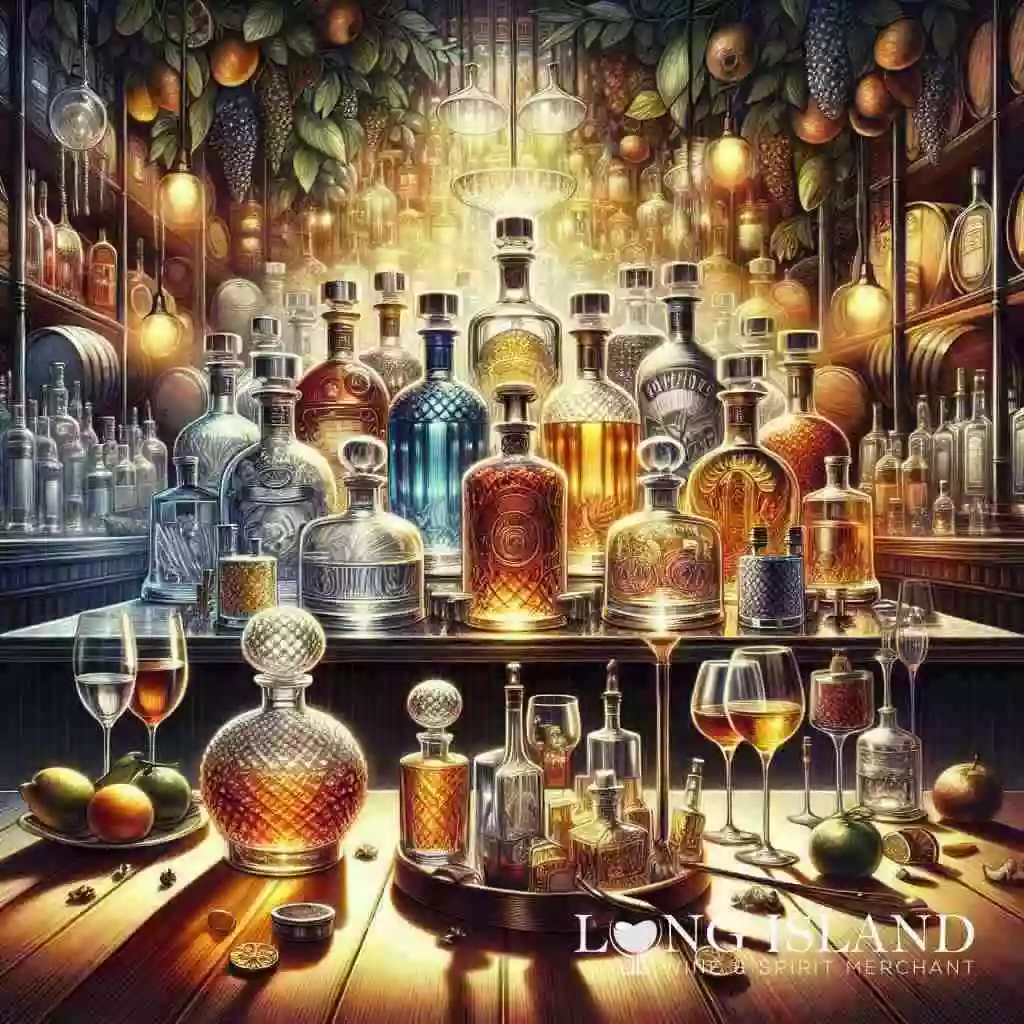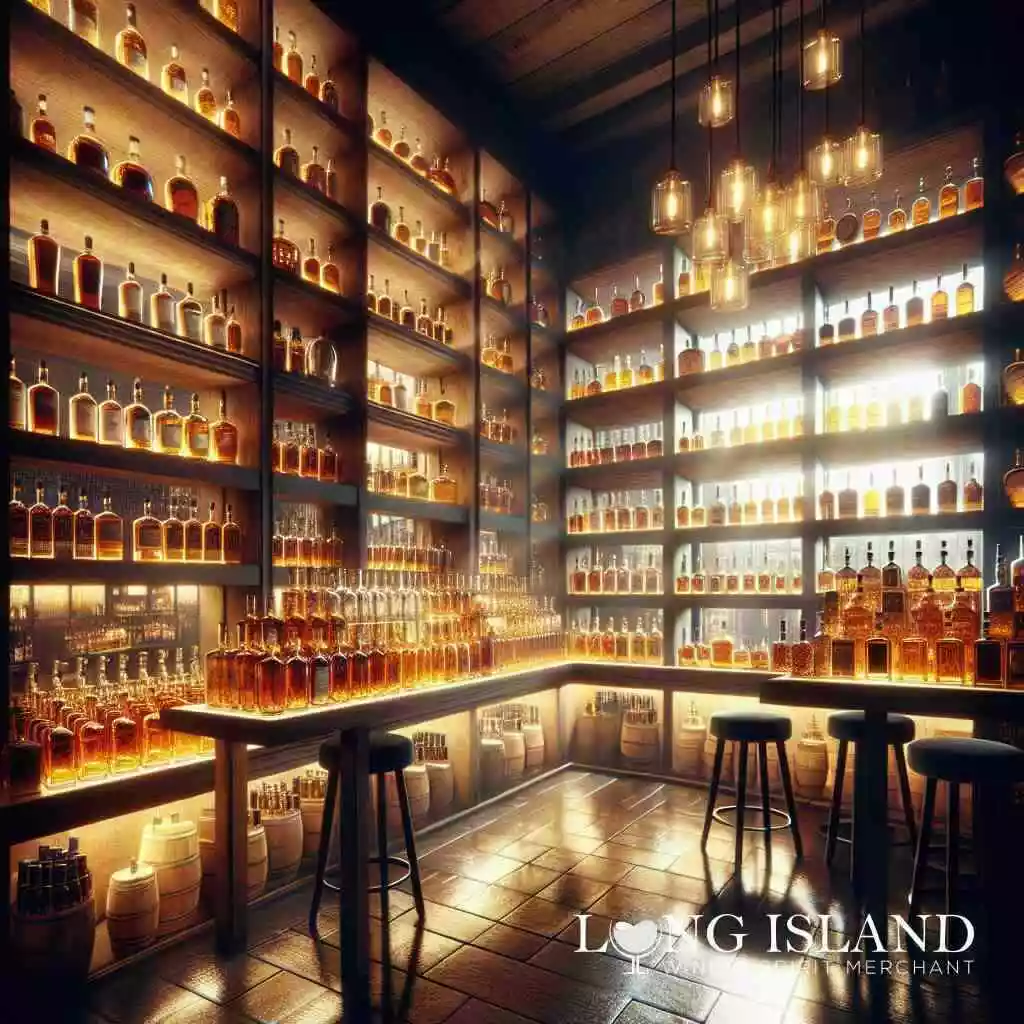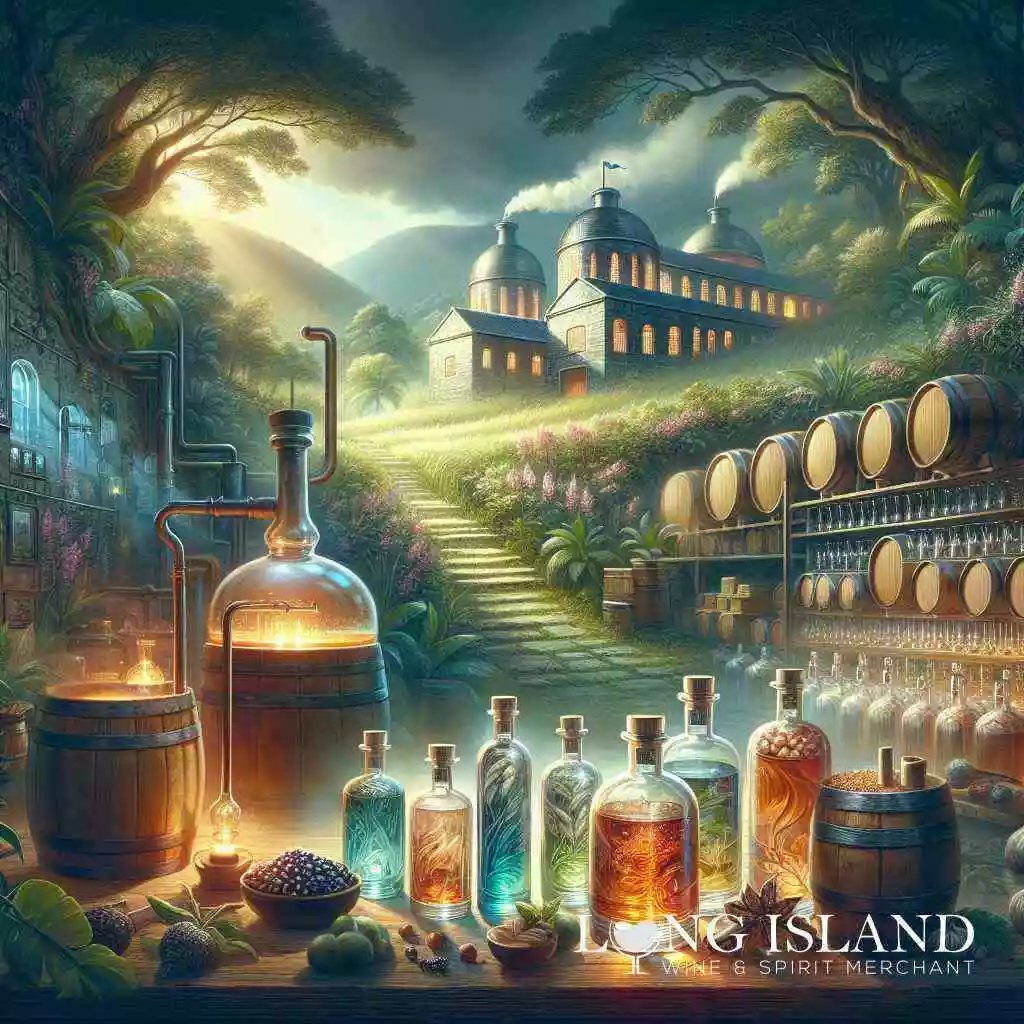
Craft Spirits 101: What Is Distilled Spirit and Why It Matters
May 5, 2024
Introduction to Craft Spirits
Defining Craft Spirits
Craft spirits, a term that resonates deeply within the world of fine beverages, refer to alcoholic drinks produced in a traditional or non-industrial manner by small, independent distilleries. These spirits are characterized by their unique flavors, high quality, and the artisanal methods behind their creation. Unlike mass-produced spirits, craft spirits embody the passion, creativity, and local flavors of their makers, offering a distinct and personalized drinking experience. The essence of craft spirits lies not just in the final product but in the meticulous process of selection, distillation, and aging, ensuring each bottle carries a unique story and flavor profile.
The Rise of Artisanal Distilling
The resurgence of artisanal distilling marks a renaissance in the spirits industry. This movement, flourishing primarily in the past few decades, signifies a shift towards valuing quality, tradition, and innovation in spirit production. Artisanal distilling has sparked interest in consumers who seek more than just alcohol,they crave a connection with the origin, process, and people behind their beverages. This shift has led to the emergence of countless local distilleries, each with their own signature spirits that reflect local heritage, ingredients, and distilling philosophies. The trend is not just about enjoying a drink,it’s about participating in a story and culture.
Importance of Craft Spirits in Modern Mixology
Craft spirits have become a cornerstone of modern mixology, inspiring bartenders and enthusiasts alike to explore new flavor combinations and cocktail concepts. With their rich flavors and high-quality ingredients, these spirits elevate cocktails from mere beverages to sophisticated culinary experiences. Bartenders often prefer craft spirits for their distinct profiles, which can transform a traditional drink into a remarkable one. Moreover, the use of artisanal spirits in cocktails aligns with the growing consumer desire for authenticity, sustainability, and innovation in what they eat and drink. The incorporation of craft spirits into modern mixology not only enhances the drinking experience but also supports the growing community of small distilleries contributing to the diversity and richness of the spirits industry.
The Basics of Distilled Spirits
Understanding Spirit Distillation Process
The spirit distillation process is both an art and a science, pivotal in creating the diverse range of spirits enjoyed worldwide. At its core, distillation involves heating a liquid to create vapor and then cooling that vapor to produce a distilled liquid. In the context of craft spirits, this process is nuanced and carefully controlled to capture the essence and flavors bestowed by unique ingredients. Starting with fermentation, where sugars are converted into alcohol, the distillation process elevates the alcohol concentration while allowing the distiller to refine and enhance the spirit’s profile. The equipment, temperature, and method used-be it pot distillation, column distillation, or a hybrid approach-play crucial roles in shaping the final character of the spirit, giving distillers the ability to craft complex, nuanced beverages that reflect their skill and creativity.
Types of Distilled Spirits
Distilled spirits encompass a broad category of alcoholic beverages, each distinguished by raw materials, distillation methods, and aging processes. Key types include:
- Vodka, celebrated for its purity and often seen as a canvas for mixologists.
- Gin, infused with botanicals like juniper, offering a spectrum of flavor profiles from earthy and floral to citrus-forward.
- Whiskey and Bourbon, which owe their rich, deep flavors to grain recipes and aging in wooden casks.
- Rum, which varies widely, from clear, light-bodied varieties to rich, aged expressions, depending on the sugar cane source and aging process.
- Tequila and Mezcal, distinguished by their agave base, with tequila coming from the blue agave and mezcal offering a smokier profile from various types of agave.
- Brandy and Cognac, derived from fermented fruit juice, typically grapes, known for their smooth, refined characteristics.
This diversity ensures that there is a spirit to suit every palate and occasion, from a simple, clean vodka martini to a complex, aged single malt whiskey.
Characteristics of High-Quality Spirits
High-quality spirits are distinguished by several key characteristics:
- Flavor Complexity: Superior spirits offer a balanced, multi-layered sensory experience, with nuanced tastes and aromas that evolve from the first sip to the lingering finish.
- Smoothness: A smooth spirit, free from harshness or unpleasant burn, speaks to careful distillation and, when applicable, thoughtful aging.
- Clarity: In non-aged spirits, clarity indicates proper distillation and filtration. In aged spirits, it translates to a rich, deep color imparted by the aging process.
- Authenticity: Premium spirits should reflect the traditional techniques and regional characteristics of their origins, offering drinkers a sense of place and tradition.
- Craftsmanship: From the selection of ingredients to the bottling, high-quality spirits bear the mark of their makers’ expertise, attention to detail, and dedication to excellence.
Recognizing these qualities in spirits not only enhances the drinking experience but also fosters appreciation for the artisanal processes and traditions that create them.
Why Craft Spirits Matter
Craft Spirit Innovation
Craft spirit innovation represents the heart of the modern distilling movement, where traditional techniques meet contemporary creativity. This innovative spirit is what drives small batch distilleries to explore uncharted territories of flavor, method, and presentation. For instance, the exploration of unique spirit flavors has led to the emergence of gins infused with locally sourced botanicals or whiskeys aged in novel wood types, pushing the boundaries of what connoisseurs expect from their spirits. This drive for innovation not only introduces consumers to new taste experiences but also sets the bar higher for quality and diversity in the industry. As distilleries experiment with everything from artisanal spirit botanicals to spirit cask aging, they contribute to a vibrant culture of ingenuity that attracts a growing audience of enthusiasts eager to explore the next big thing in spirits.
Economic Impact of Craft Distilleries
The rise of craft distilleries has made a notable economic impact, particularly in local and regional markets. By focusing on small-scale production, these distilleries create jobs, drive tourism, and support local agriculture. For many rural and urban areas alike, craft distilleries have become integral to community development and revitalization, bringing in visitors for tours, tastings, and events. Furthermore, as demand for craft spirits grows, so does the need for locally sourced ingredients, such as grains, fruits, and botanicals, thereby providing a boost to local farmers and producers. The economic ripple effect of a single craft distillery can be significant, contributing to the sustainability and growth of local economies.
Contribution to Local Communities and Sustainable Practices
Craft distilleries often pride themselves on their contribution to local communities and their commitment to sustainable practices. This goes beyond the economic impact, touching on environmental responsibility and community engagement. Many sustainable distilleries prioritize the use of organic ingredients, reduce water usage, and implement energy-efficient distillation processes to minimize their environmental footprint. By doing so, they not only produce high-quality spirits but also align with the values of consumers who are increasingly concerned about sustainability. Moreover, craft distilleries frequently engage with their communities through charity events, local partnerships, and educational programs, strengthening their role as community pillars. This dual focus on sustainability and community involvement cements the importance of craft distilleries in fostering both environmental stewardship and social cohesion.
The Craft Spirit Production Process
Step-by-Step Guide to Spirit Production
The production of craft spirits is a methodical process that blends tradition with innovation. It begins with the selection of quality ingredients, which form the foundation of the spirit’s flavor profile. These might include grains, fruits, or botanicals, depending on the type of spirit being produced. Next is the mashing process, where solid ingredients are mixed with water and heated, converting starches into fermentable sugars. This mash is then cooled and transferred to fermentation vessels.
Fermentation is a critical step, where yeast is added to the mash to convert sugars into alcohol and carbon dioxide. This conversion can take anywhere from a few days to several weeks. After fermentation, the liquid, now called a wash, contains alcohol along with numerous other components that will influence the final taste.
Distillation follows, a process that separates the alcohol from the wash by heating. As alcohol evaporates at a lower temperature than water, it can be collected and condensed back into a liquid form. This process may be repeated multiple times to achieve the desired purity and strength. The distilled spirit is then aged in barrels or other containers, allowing it to acquire flavors from the material of the container, such as spirit cask aging, which is common for whiskeys and rums. Finally, before bottling, the spirit may be filtered and diluted to the desired proof with pure water.
Small Batch Spirits vs. Mass-Produced Spirits
The contrast between small batch and mass-produced spirits lies in scale, craftsmanship, and personal touch. Small batch spirits are often produced with meticulous attention to detail, allowing for more experimental and artisanal practices throughout the production process. This approach often results in a higher quality, more complex spirit that reflects the unique character of its ingredients and the craftsmanship of its makers. Producers have the flexibility to experiment with different fermentation techniques, types of distillation, and aging conditions that would be impractical on a larger scale.
On the other hand, mass-produced spirits prioritize consistency and volume. Advanced technologies and standardized methods are used to produce large quantities of spirit that tastes the same batch after batch. While this approach meets the demand for popular spirits, it often limits the flavor complexity and uniqueness found in small batch spirits. Moreover, mass production does not typically allow for the same level of sustainability practices that small craft distilleries can maintain.
The Role of Spirit Fermentation and Aging
The role of fermentation in spirit making is pivotal, as it directly influences the alcohol content and flavor profile of the spirit. Different strains of yeast and varying fermentation conditions can produce a wide range of flavor compounds, contributing to the spirit’s final taste. This diversity allows craft distillers to innovate and create distinctive spirits that reflect their brand’s ethos.
Aging is equally important in the craft spirit production process. During aging, the spirit undergoes various chemical reactions, interacting with the air and the container in which it is stored. The choice of container-often oak barrels for many spirits-can impart a range of flavors, from vanilla and caramel to fruit and spice notes, dramatically enhancing the spirit’s complexity and depth. The aging process also mellows the spirit, making it smoother and more palatable. Together, fermentation and aging are essential contributors to the quality and distinctiveness of craft spirits, enabling small distilleries to offer premium, nuanced products that stand out in the global spirits market.
Exploring Spirit Flavor Profiles
Tasting Notes and Flavor Complexity
Delving into the world of craft spirits opens up a universe of flavor complexities, each spirit possessing a unique profile that entices the senses. Tasting notes in these beverages range from the subtle whispers of fruits and spices to bold declarations of smoke and oak, depending on the distillation process, aging, and ingredients used. For instance, a single malt whisky might hint at vanilla, honey, and peat, while a premium gin infused with artisanal spirit botanicals could surprise the palate with floral, citrus, and herbaceous notes. Engaging in a handcrafted spirits tasting session allows enthusiasts to explore these nuances, educating their palates to discern and appreciate the wide array of flavors that high-quality, carefully crafted spirits have to offer. Such exploration not only enhances the enjoyment of these beverages but also elevates the appreciation for the craftsmanship behind each bottle.
Spirit Botanicals and Their Impact
Botanicals are the heart and soul of many distilled spirits, imbuing them with a complexity and character that is impossible to replicate otherwise. Gin, for example, owes its distinctive flavors to the careful selection of botanicals like juniper, coriander, citrus peels, and various herbs and spices. These ingredients, when expertly chosen and balanced, create a symphony of flavors that can transport the drinker from the sun-soaked Mediterranean coasts to the dense, aromatic forests of the north. Exploring artisanal spirit botanicals reveals the deep connection between the spirit and its origin, as many distillers choose local flora to imbue their concoctions with a sense of place. This connection underscores the importance of botanicals not just in flavoring the spirit but also in connecting the drinker to the earth and the unique landscapes from which these spirits spring.
Unique Spirits from Around the World
The world of craft spirits is as diverse as the cultures that inhabit this planet, with each region offering something unique and spectacular to the global spirits landscape. From the smoky, peated whiskies of Scotland to the vibrant, agave-rich tequilas of Mexico, every country has its signature spirit that embodies its heritage and terroir. Adventurous drinkers might find themselves captivated by Japan’s meticulously aged whiskies, or perhaps enchanted by the floral grace of French cognacs. Exploring these unique spirits from around the world not only broadens one’s taste horizons but also offers a liquid journey to distant lands, cultures, and traditions. Such exploration underscores the richness of the human experience, distilled into bottles of lovingly crafted beverages that await the eager connoisseur at establishments like Liquor Store Open, where a curated selection of the world’s finest spirits brings global flavors to your doorstep.
Craft Distilleries and Their Stories
Spotlight on Local Distilleries
Local distilleries are the beating heart of the craft spirits movement, each with its own unique story and identity. Tucked away in the countryside or nestled within bustling city streets, these distilleries are not just producers of fine spirits but also guardians of tradition and innovation. At the core of local distilleries is a dedication to quality and a commitment to showcasing the nuances of their specific locale through their products. From the grains they select to the botanicals that infuse their gin, everything is chosen with care to reflect the local environment, culture, and history.
Visiting a local distillery often involves more than just a tasting. It’s an immersive experience where visitors can see firsthand the meticulous process of artisan spirits distillation, from fermentation to aging, and hear directly from the distillers about the passion and hard work that goes into every bottle. These visits strengthen the connection between the product and the consumer, transforming each sip into a story of its own-a story of people, place, and craft.
Sustainable Spirits and Their Makers
In an era where sustainability is more important than ever, many craft distilleries are leading the way in implementing environmentally friendly practices. The ethos of sustainable spirit production is deeply ingrained in the philosophy of these makers, who often leverage local, organic ingredients to minimize their carbon footprint and support the local economy. Water conservation, energy efficiency, and waste reduction are key focuses, with some distilleries going as far as using renewable energy sources to power their operations.
The makers behind sustainable spirits are driven by a vision that exceeds mere profit. They aim to create a product that not only delights the palate but also contributes positively to the planet. By integrating sustainable practices into every aspect of their production, from sourcing to packaging, these distilleries set a standard for the industry and inspire consumers to make more environmentally conscious choices. Their commitment to sustainability is a testament to the possibility of combining traditional craft with modern values, resulting in spirits that are not only superior in quality but also kinder to the Earth.
Innovation and Tradition in Craft Spirit Brands
The dual forces of innovation and tradition define the essence of craft spirit brands. On one side, there is a deep respect for the time-honored methods of spirit production-techniques passed down through generations that have stood the test of time. On the other, there is a relentless drive toward creativity and exploration, leading to the development of new flavors, distillation techniques, and brand concepts that push the boundaries of what spirits can be.
Craft distilleries effortlessly marry these two elements, honoring their roots while boldly stepping into uncharted territories. This might manifest in the revival of ancient spirits almost lost to time or in the creation of entirely new categories that challenge conventional perceptions. The willingness of craft spirit brands to experiment, whether through unique spirit flavors, aging processes, or sustainable production techniques, contributes to a dynamic and ever-evolving industry landscape.
Such innovation, coupled with a foundation of tradition, ensures that the craft spirits sector remains vibrant and relevant. It invites connoisseurs and casual drinkers alike to embark on gustatory adventures, discovering the rich tapestries of flavors and stories woven by these artisanal brands. Through their dedication to both preserving and progressing the art of distillation, craft spirit brands not only captivate the market,they also write new chapters in the age-old narrative of distilled spirits.
A Guide to Craft Spirit Tasting
How to Taste Spirits Like a Pro
Tasting craft spirits is an art that offers an immersive experience into the world of flavors, aromas, and textures. To taste spirits like a pro, it’s essential to engage all your senses. Begin by observing the spirit’s color and clarity in a well-lit room, which can give you clues about the spirit’s aging process and the raw materials used. Swirl the spirit gently in your glass to release its array of aromas. Take a moment to inhale deeply, identifying the different scents-this could range from floral and fruity to smoky and earthy, depending on the spirit. When it’s time to taste, take a small sip and let it coat your palate. Notice the initial flavors, the mouthfeel, and how these evolve into the aftertaste. Craft spirit tasting events often emphasize the importance of comparing notes with fellow tasters, as discussing observations can enhance the learning experience.
Craft Spirit Tasting Events and Tours
Craft spirit tasting events and tours offer enthusiasts a golden opportunity to delve deeper into the craft spirit world. These events serve as an excellent platform for distillers to showcase their artisanal spirits, sharing the unique stories behind their creations. Participants get the chance to sample a variety of spirits, learning about the distillation process, the ingredients used, and the aging techniques that contribute to each spirit’s distinct profile. Tours of the distillery provide a behind-the-scenes look at the craft spirit production process, from spirit fermentation to barrel aging, allowing visitors to observe the meticulous care and skill involved in creating premium spirits. These experiences not only deepen one’s appreciation for craft spirits but also connect enthusiasts with the passionate community behind these artisanal products.
Pairing Food with Craft Spirits
Pairing food with craft spirits can elevate a meal to an exquisite culinary adventure, where the flavors of the food and the spirit complement and enhance each other. The key to successful pairings lies in balance and harmony-consider the intensity and dominant flavors of both the spirit and the dish. Lighter spirits like gin or white rum might pair well with delicate seafood or fresh salads, while richer, aged spirits such as whiskey or brandy can complement hearty meat dishes or desserts with deep, bold flavors. Experimenting with flavors can lead to delightful surprises,for instance, the smoky notes of a mezcal can beautifully offset the sweetness of a tropical fruit dessert. Engaging in the practice of pairing food with craft spirits not only enriches the dining experience but also encourages creativity and a deeper understanding of flavor dynamics.
Craft Spirits in Cocktails
Craft Spirit Cocktails and Recipes
Craft spirits serve as the cornerstone for creating cocktails that are not just drinks but experiences. The emergence of craft spirit cocktails marks a renaissance in the drink industry, where the emphasis is on quality, creativity, and taste. Artisanal cocktails, made with spirits distilled with care and complexity, offer a nuanced drinking experience that mass-produced spirits can’t match. Recipes that incorporate these artisanal spirits encourage a deeper appreciation of the drink itself, urging consumers to savor every sip. From a classic gin and tonic made with handcrafted gin to a smoky mezcal cocktail, the possibilities are endless. Moreover, these recipes often revive forgotten classics or introduce innovative combinations, pushing the boundaries of traditional mixology.
The Importance of Using Quality Ingredients
In the realm of craft cocktails, the importance of using quality ingredients cannot be overstated. The use of premium spirits brands, fresh herbs, organic fruits, and artisanal bitters can transform a simple drink into a memorable experience. Quality ingredients contribute to the depth and character of a cocktail, highlighting the unique attributes of the craft spirit at its base. Furthermore, these high-quality components not only enhance flavor but also elevate the cocktail’s aesthetic appeal, making it as delightful to the eyes as it is to the palate. Considering the consumer’s growing interest in the origins and production of what they consume, integrating quality, sustainably sourced ingredients aligns with their values and enhances their overall drinking experience.
Mixology Trends Featuring Craft Spirits
The cocktail scene is continuously evolving, with mixology trends often reflecting broader cultural shifts towards authenticity, sustainability, and artisanal craftsmanship. Craft spirits, with their unique profiles and stories, are at the forefront of these trends, giving bartenders and home mixologists a rich palette to work with. Recent trends have seen a surge in farm-to-glass cocktails, where local, seasonal ingredients are paired with small-batch spirits to create drinks that are both innovative and rooted in locality. Another notable trend is the resurgence of historical recipes, with mixologists delving into the past to revive forgotten cocktails with a modern twist using today’s craft spirits. These trends not only showcase the versatility and appeal of craft spirits but also contribute to a more engaged and curious drinking culture, eager to explore beyond the conventional.
Caring for Your Craft Spirits Collection
Storage Tips for Distilled Spirits
Proper storage is crucial to maintaining the integrity and flavor of your distilled spirits. Like fine wines, craft spirits require specific conditions to preserve their quality over time. Ideally, spirit bottles should be stored upright to prevent the spirit from degrading the cork, which could affect the air seal and, consequently, the spirit’s flavor. Keep them in a cool, dark place where the temperature and humidity are consistent. Exposure to sunlight or significant temperature fluctuations can lead to deterioration of the spirit. Additionally, it’s essential to avoid storing spirits near strong-smelling substances, as spirits can absorb odors, which might alter their unique aroma and taste profiles.
Building a Home Bar with Craft Spirits
Creating a home bar stocked with an array of craft spirits is not just about showcasing your collection but also about crafting a personal space where creativity in drink mixing flourishes. Start with a foundation of versatile spirits, including gin, whiskey, and rum, then expand your selection to include specialty spirits with unique regional botanicals or aging processes. Equally important is investing in quality bar tools and glassware, which can elevate your mixology experience. Decorate and organize your bar area in a way that highlights the uniqueness of each bottle, perhaps with labels facing forward and the more frequently used spirits within easy reach. A well-curated home bar can serve as a conversation piece and the centerpiece for gathering friends and family for memorable cocktail experiences.
Custom Cases of Liquor and Engraved Bottles
For those looking to add a personal touch to their craft spirits collection or give a thoughtful gift, custom cases of liquor and engraved bottles offer a unique and elegant solution. Personalized engraving on a bottle of high-quality spirit makes for a timeless gift, whether it’s for a special occasion, a thank you, or a milestone celebration. Companies like Liquor Store Open provide services such as liquor bottle engraving and custom cases, allowing customers to custom-select assortments of their favorite spirits. These custom offerings can transform an ordinary bottle of liquor into a keepsake to be cherished long after its contents are enjoyed. Incorporating these personalized elements into your craft spirits collection or as part of a gift not only elevates the aesthetic appeal but also adds a layer of thoughtfulness and sophistication to the drinking experience.
The Future of Craft Spirits
Emerging Craft Spirit Trends
The craft spirits industry, much like a fine alcoholic drink distilled with care and precision, is constantly evolving, reflecting broader cultural and consumer shifts. In recent years, we’ve seen a marked rise in the demand for transparency regarding production processes and ingredient sourcing. Consumers aren’t just interested in the taste,they want to know the story behind what’s in their glass, including where ingredients come from and how they’re cultivated. This interest has spurred craft distilleries to focus even more on local sourcing and sustainable practices, ensuring that every drop tells a tale of locality and responsibility.
Another significant trend is the experimentation with non-traditional ingredients and aging processes. Unique botanicals, unconventional yeasts, and innovative aging environments (such as underwater or in different climates) are creating spirits with unexpected and complex flavor profiles. These methods are pushing the boundaries of traditional spirits categories, offering a new tasting experience for adventurous consumers.
Additionally, there’s a growing intersection between craft spirits and technology. From blockchain for authenticity tracking to the use of AI in predicting flavor outcomes, technology is becoming a silent partner in the craft spirit production process. This fusion not only enhances the quality and uniqueness of the spirits but also appeals to a generation that values innovation alongside tradition.
Craft Spirit Awards and Recognitions
The celebration of craft spirits through awards and recognitions has played a pivotal role in elevating the status of small distilleries on the global stage. Competitions such as the San Francisco World Spirits Competition, the World Whiskies Awards, and the International Wine and Spirit Competition have categories dedicated to craft spirits, acknowledging excellence in flavor, innovation, and design. These accolades not only validate the distiller’s hard work and vision but also help consumers navigate the expanding landscape of craft spirits.
Recognition goes beyond competitions, with influential publications and industry insiders curating annual lists of the most notable craft spirits. These endorsements serve as a beacon for consumers looking to explore high-quality, innovative spirits and for trade professionals seeking the next trendsetting brand. They highlight the creativity and craftsmanship that define the sector, from exceptional premium spirits brands to groundbreaking production methods.
Predictions for the Craft Distillery Industry
The trajectory of the craft distillery industry suggests a future that’s ambitious and bright. As the demand for authenticity and quality continues to rise, we can anticipate a sustained increase in small batch and artisanal spirits production. Consumers’ growing interest in the heritage and story behind their spirits is likely to result in even more distilleries emphasizing local heritage and using native ingredients, celebrating the diversity of spirits production worldwide.
Another prediction is the expansion of the craft spirit market to embrace more hybrid and experimental spirits. These offerings will likely blur the lines between traditional categories, introducing consumers to entirely new sensory experiences. Moreover, environmental sustainability will become an even more critical factor, with distilleries investing in renewable energy sources, waste reduction practices, and organic certifications to appeal to the eco-conscious consumer.
Finally, technology will play a significant role in both the production and consumer engagement aspects of craft spirits. From augmented reality labels that tell a spirit’s story to precision distillation equipment controlled via smartphone, the integration of tech will make the craft spirit experience more interactive and personalized than ever before.
The craft spirits industry is at a thrilling crossroads, with innovation, tradition, and sustainability converging to shape its future. As it continues to evolve, one thing remains clear: the appreciation for finely crafted spirits, rich with story and flavor, is a universal constant that will continue to grow and enrich the global drinks culture.
Conclusion: The Craft Spirit Revolution
Recap of Craft Spirits Impact
The ascent of craft spirits has marked a significant shift in the landscape of distilled beverages, heralding a new era where quality, creativity, and authenticity reign supreme. Throughout this exploration, it’s been clear that the movement is not just about producing an array of spirits but about fostering a deeper connection between producers and consumers. Craft spirits are distilled narratives of their makers’ philosophies, emphasizing the use of local ingredients, traditional methods, and innovative techniques. This revolution has not only enriched the global spirits market with an array of unique and complex flavors but has also contributed significantly to local economies, supported sustainable practices, and inspired a new generation of distillers and drinkers alike.
Why Supporting Craft Distilleries Matters
Supporting craft distilleries extends beyond the appreciation of fine spirits, it’s an investment in small businesses that contribute to the diversification and vibrancy of local and global markets. Craft distilleries often prioritize sustainability, community engagement, and the preservation of traditional distilling methods, values that resonate with a growing number of consumers. By choosing craft spirits, consumers help sustain these establishments and enable them to continue innovating and producing high-quality spirits. Moreover, craft distilleries often lead in implementing sustainable practices in the industry, from red wine aging in eco-friendly barrels to using organic and locally sourced ingredients for white wine production, setting standards that can inspire change across the spirits industry.
Elevating Your Spirits Experience with Craft Choices
The decision to explore and embrace craft spirits is not merely a choice of preference but a step toward elevating one’s spirits experience. Craft spirits offer complexity and a diversity of flavors that mass-produced spirits can rarely match, providing an enriched tasting experience that educates the palate and deepens one’s appreciation for distilled beverages. Furthermore, engaging with craft spirits opens up opportunities to learn about the culture, history, and techniques behind spirit production, adding layers of enjoyment and understanding to every sip. Whether through visiting local distilleries, participating in tasting events, or curating a personal collection of artisanal spirits, individuals can actively partake in the craft spirit revolution, celebrating and perpetuating the artistry and authenticity that define this vibrant movement.
By embracing craft spirits, enthusiasts not only indulge in high-quality, distinctive beverages but also contribute to a culture that values craftsmanship, community, and sustainability. The future of craft spirits shines brightly, promising continued innovation and an ever-expanding tapestry of flavors to delight and inspire the global community of spirit lovers.
Frequently Asked Questions
Question: Can you recommend the best craft spirits for someone new to artisanal spirits, as inspired by your guide “Craft Spirits 101: What Is Distilled Spirit and Why It Matters”?
Answer: Absolutely! For those new to the world of artisanal spirits, we recommend starting with spirits that showcase the breadth and depth of craft distillation. A smooth and versatile gin, a richly flavored single malt whiskey, and a small batch rum demonstrate a range of spirit flavor profiles and distillation techniques. Our carefully curated selection at Liquor Store Open includes premium spirits from across the globe, providing an excellent introduction to craft spirits. Each of these spirits is selected for its distinct characteristics and craftsmanship, perfect for elevating your spirits experience and diving into the vibrant world of craft distilleries. Whether you’re looking to explore the nuanced botanicals in gin or the complex flavor profiles inherent in single malt spirits, our selection at Liquor Store Open, servicing Commack, New York on Long Island and shipping in all 50 states, is designed to cater to both novice enthusiasts and seasoned connoisseurs alike.
Question: How does Liquor Store Open ensure the quality of its craft spirit offerings, especially considering the wide range of distilled spirits available?
Answer: Liquor Store Open, also known as Long Island Wine & Spirit Merchant, prides itself on offering only the finest spirits selected for their craftsmanship, authenticity, and flavor complexity. We work closely with craft distilleries, premium spirits brands, and artisanal producers to curate a collection that represents the best of small batch spirits and distilled spirits. Our selection process involves meticulous tasting and evaluation, ensuring each spirit meets our high standards for flavor, smoothness, and overall quality. Additionally, we stay updated on craft spirit trends and industry recognitions, such as craft spirit awards, to offer our customers award-winning and innovative options. By offering services like liquor delivery, liquor bottle engraving, and custom cases of liquor, we provide a personalized shopping experience that puts the finest craft spirits within easy reach for our customers across all 50 states.
Question: How do I incorporate craft spirits into my home bar, considering the focus on quality and creativity?
Answer: Building a home bar with craft spirits from Liquor Store Open involves selecting high-quality, distinctive beverages that reflect both your personal taste and the creativity inherent in craft spirit production. Start by choosing foundational spirits such as artisanal gin, small batch whiskey, and premium vodka to ensure a versatile base for a range of cocktails. Then, add unique spirits that highlight innovative distillation methods and unique botanicals, such as handcrafted amaro or pot distilled spirits, to introduce creativity and diversity. Don’t forget to include mixology essentials like vermouth, bitters, and a selection of liqueurs to add depth and complexity to your cocktails. Liquor Store Open offers a curated selection of craft spirits, cocktail ingredients, and bar essentials, ensuring your home bar is both sophisticated and reflective of the craft spirit revolution. With our expertise and services like liquor bottle gift boxes and engraved bottles, creating a personalized and elevated spirits experience at home has never been easier.
Question: What sustainability practices do craft distilleries featured by Liquor Store Open adhere to, and why is this important?
Answer: The craft distilleries we feature at Liquor Store Open are selected not only for their exceptional spirits but also for their commitment to sustainability and environmental stewardship. Many of these distilleries prioritize the use of organic and locally sourced ingredients, reducing transportation emissions and supporting local agriculture. They also implement sustainable practices in their production processes, such as water conservation, energy-efficient distillation methods, and recycling or repurposing waste products. By focusing on sustainable spirits, we believe we’re not only offering our customers high-quality, flavorful spirits but also contributing positively to the environment and local communities. Supporting these sustainable craft distilleries aligns with our customers’ values and helps promote a healthier planet. Discover our selection of sustainable spirits at Liquor Store Open, where quality meets responsibility in every bottle.
Question: With the rise of craft spirit trends, how does Liquor Store Open stay ahead in offering the latest and most innovative spirits?
Answer: Liquor Store Open stays at the forefront of craft spirit trends by actively engaging with the distilling community, attending industry events, and keeping a close eye on emerging craft spirit awards and recognitions. Our collaboration with small batch producers and craft distilleries ensures access to the latest innovative spirits, including those featuring unique ingredients, unconventional aging processes, and cutting-edge distillation techniques. Our team is dedicated to exploring and introducing our customers to emerging trends, such as spirits distilled with non-traditional botanicals or those embracing eco-friendly production methods. By curating an ever-evolving selection of craft spirits, we ensure that our customers, whether in Commack, New York on Long Island or across all 50 states, have access to a diverse and contemporary spirits collection that reflects the dynamic nature of the craft spirits industry.
